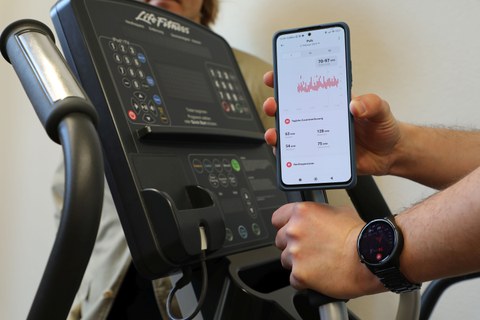Feb 10, 2023
Linking and sharing health data anonymously, securely and transparently
PATH research project receives 2.27 million euros in BMBF funding for the development of a platform in compliance with data protection laws that will link health data from patient records with that from health and wellness apps in the future.
The way we gather health data is changing. Smart watches and phones are already capable of recording many of our vital signs, sending warnings when this data seems abnormal and motivating people to move more. Health data is no longer collected exclusively by medical professionals and stored in analog patient files. We are now all able to automatically record our steps, heart rate, blood sugar levels and a lot more ourselves using home tests or a smart phone and apps. However, this data is usually not available to physicians for diagnosis or treatment, nor for research. With the “PATH – Personal Mastery of Health and Wellness Data” project, researchers therefore want to create a platform in compliance with data protection laws that links personal health data from patient files with data collected by individuals using smart watches or sensors. The Federal Ministry of Education and Research (BMBF) is supporting this project with 2.27 million euros in funding over a period of three years as part of the framework program for information security entitled “Digital. Sicher. Souverän” (Digital. Secure. Sovereign).
Control over your own health data
With the launch of the project, Prof. Stephen Gilbert, PATH Project Coordinator at the Else Kröner Fresnius Center (EKFZ) for Digital Health at TU Dresden and Dresden’s Carl Gustav Carus University Hospital, explained its benefits and objectives: “The digital transformation of healthcare revolves around data and connectivity. For this reason, having access to secure and trustworthy data in a clinical context is of the utmost importance. If we are able to create a data space where a patient’s combined health and wellness data is available across institutions and treatment sites, or anonymized and available to research, we will be making a fundamental improvement to healthcare services as well as research. With the data hub, medical data and parameters collected individually from analog patient records will be integrated into a single platform for the first time, which of course also complies with data protection regulations. This allows each patient to have control over their data, with the knowledge of who collects and holds what data and what it is used for.”
Case studies for diabetes and psychiatry
PATH will develop approaches for anonymizing and sharing health data that can be applied across medical specialties. Health data from diabetes and psychiatry patients will be available in case studies during the project. Two apps are currently under development. One supports the creation of individualized nutrition therapy for diabetes patients. The second will be deployed in the mental health field to digitally detect early warning signs of depression. This app can support psychiatrists by providing information on a patient's changes in communication and as such enables early intervention in the development of mania or depression.
Data protection-compliant platform links health data
All users can decide for themselves what information they want to share thanks to intuitive and easy-to-use interfaces in the data hub. “Particularly for data derived from conventional health services, it is critical that users consent to the collection of their data, the linking thereof to their medical records, and the subsequent sharing of anonymized data. They must have total control of this process and have the opportunity to change their consent at any time. The Bundesrat acknowledged this in their resolution published on December 16 and our project will provide ideas to make this possible,” said Prof. Gilbert. The researchers are also developing open source modules for obtaining and managing consent and for monitoring the use of data in research. The platform can provide access to completely anonymized medical data. In this way, the project partners aim to create a coordinated, transparent infrastructure for exchanging individually generated health data. This will enable meaningful, collaborative use in the future and give individuals control over their own data. In addition, the platform has the potential to improve communication between patients and physicians, facilitate clinical discussions among medical staff and increase the efficiency of emergency care.
Background:
The PATH project is funded by the Federal Ministry of Education and Research as part of the framework program for information security entitled “Digital. Sicher. Souverän” (Digital. Secure. Sovereign). The “PATH – Personal Mastery Health & Wellness Data” collaborative project will receive 2.27 million euros in federal funding over a three-year period (2023–2025). The project volume totals 3.4 million euros.
Project partners:
Else Kröner Fresenius Center for Digital Health, Technische Universität Dresden, Institute of International Law, Intellectual Property and Technology Law, Chair of Digital Cultures, Carl Gustav Carus University Hospital Dresden, Leipzig University Hospital, Center for Evidence-Based Healthcare (ZEGV), Ada Health GmbH, Una Health GmbH, movisens GmbH.
Media inquiries:
EKFZ for Digital Health
Anja Stübner
Public Relations Advisor
Tel.: +49 351 458 11 379

